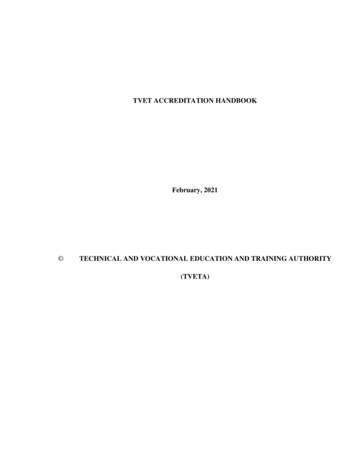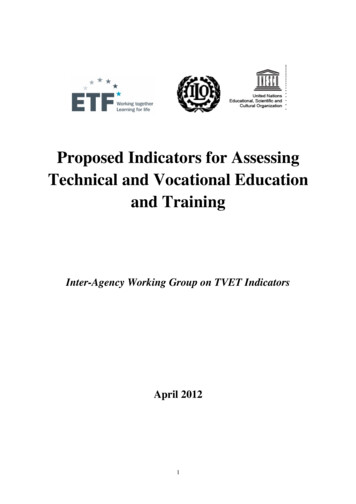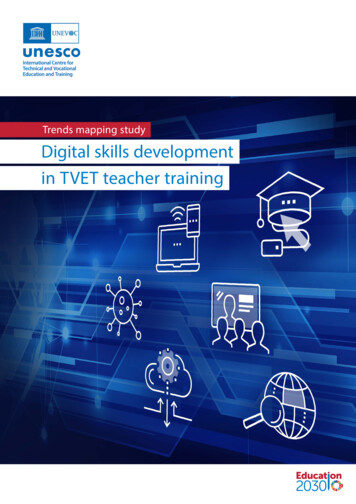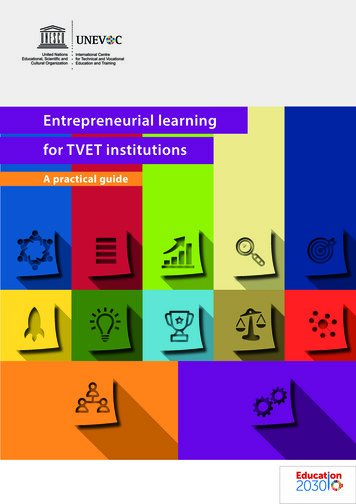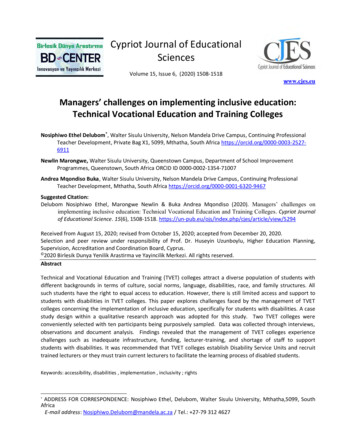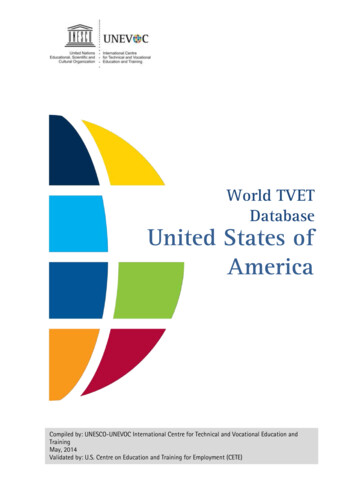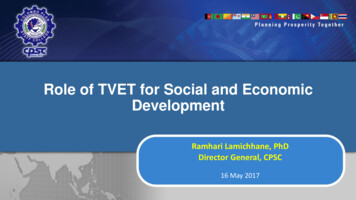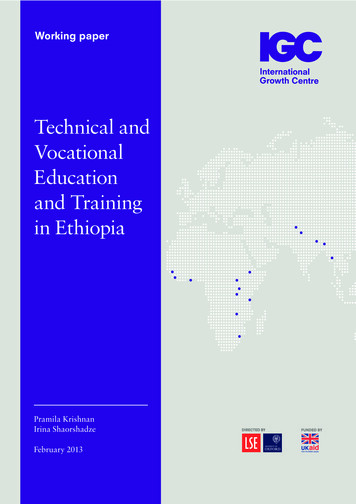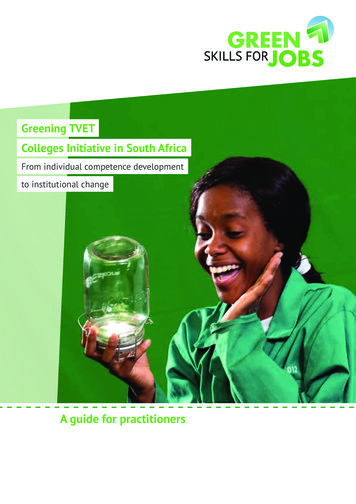
Transcription
GREENSKILLS FORJOBSGreening TVETColleges Initiative in South AfricaFrom individual competence developmentto institutional changeA guide for practitioners
EditorSkills for Green Jobs (S4GJ)Deutsche Gesellschaft für InternationaleZusammenarbeit (GIZ) GmbHRegistered offices: Bonn and EschbornGIZ Office PretoriaP.O. Box 13732, Hatfield 0028Hatfield Gardens, Block C, 2nd Floor,333 Grosvenor StreetPretoria, South AfricaTel.: 27 (0) 12 423 5900E-mail: giz-suedafrika@giz.dewww.giz.deResponsible: Edda GrunwaldPhoto: Ralf Bäcker, version-fotoPretoria, September 2014environmental affairsDepartment:Environmental AffairsREPUBLIC OF SOUTH AFRICA
ContentForeword DHET. 5Preface DEA. 6Foreword GIZ-S4GJ. 71 Role and tasks of TVET colleges in the context of a greening economy. 91.1 Need for greening the economy . 91.2 TVET – master key for a green(ing) economy . 111.3 Greening TVET institutions . 122 The Greening TVET institutions approach . 142.1 Overview. 142.2 Principles of greening TVET institutions. 152.3 Getting started: Greening TVET institutions in seven steps. 163 Greening TVET institutions: examples and experiences from South Africa. 283.1 Procedure. 283.2 Interim results. 303.2.1 Green Campus. 303.2.2 Green Curriculum. 343.2.3 Green Research. 353.2.4 Green Community. 353.2.5 Green Culture. 363.2.6 Management Integration. 37Bibliography. 39Contact. 40Annex: Greening TVET institutions in Germany . 41Introduction. 41Green campus: Greening the campus systematically . 41Green curriculum: Full-time vocational school “Renewable Energy Technology“ . 42Green research: Training for a sustainable regional energy supply . 43Green community: Apprentices take on sponsorship for a local creek . 44Green culture: Future lab for the design of a patio . . 45Management integration: Greening in the frameworkof an environmental management system . 46Greening TVET institutions based on a holistic approach. 47The Vocational and Technician College Butzbach . 47Interview with Mr Jens Voss, Head of Environment and Energy Departmentof the Vocational and Technician College Butzbach. 51The Vocational College for Construction Occupations of the Hanover Region. 52The Vocational College for Construction Occupations of the Hanover Region at a glance. 52The Centre for Energy Efficient Civil Engineering & Building Technology. 52Interview with Mr Ulrich Erdmann, Principal of Vocational Collegefor Construction Occupations of Hanover Region. 56
Foreword DHETThe Department of Higher Education and Training is pleased to be part of the Greening of Technical and Vocational Education and Training (TVET) colleges’ initiative in South Africa.The “Greening of Colleges” initiative, which aims to establish colleges as green environments is based on international best practices in the greening of colleges was launched early in May 2013 and currently involvesseven colleges in the pilot phase.The seven colleges participating in the project are: Boland TVET College Central Johannesburg TVET College Eastcape Midlands TVET College Northlink TVET College Northern Cape Rural TVET College Port Elizabeth TVET College Umfolozi TVET CollegeIn this context, the ‘Greening of Colleges’ initiative focuses on the development of special green profiles andthe integration of green issues in selected TVET colleges. Green TVET colleges are critical as it integratesgreen issues into training programmes, college policies and plans. Ideally, they live what we preach by reducing the carbon footprint on their campuses. They also integrate their internal, and as far as possible external stakeholders in the greening process through train-the-trainer programme for companies and supporting communities in improving their living conditions through green projects. In addition the greeningcolleges do not stand alone but are connected with other colleges in national and international networks.South Africa’s future energy supply will need to have lower greenhouse gas emissions in order to meet thechallenges posed by climate change. The need for informed and trained human resources in this field continues to be a significant driver in future employment. The Industrial Development Corporation and South African Development Bank in 2011 estimated that the total employment potential of the green economy would beover 450 000 direct jobs over the long term until 2030, whilst the projections under the category for energygeneration, and energy and resource efficiency for the long term would be 130 000 and 68 000 respectively.This initiative serves as a vital purpose in harnessing the skills development efforts of the Department.South Africa lags significantly behind in promulgating policy that coerces or compels ‘green behaviour’ in ordinary citizenry. Until there is a massive national mind shift towards caring for the environment, all otherinitiatives are likely to be driven by business imperatives alone which are undesirable. The nation’s psychehas to be shaped in a way that makes environmental protection and preservation a norm rather than a special intervention. There is no better place to begin than with the thousands of young people in our institutions who have massive footprints into local communities and regions, and are able to spread the attitudes,knowledge and values around greening behaviours.Mr GF QondeDirector-General: Higher Education and Training5
environmental affairsDepartment:Environmental AffairsREPUBLIC OF SOUTH AFRICAPreface DEAThe Environmental Sector Skills Plan (ESSP,DEA, 2010) released by the Department of Environmental Affairs describes the status quo with regard to the demand and supply of environmental skills and providesthe best available information on scarce and critical skills in the sector at present. Furthermore, the ESSPidentified skills gaps in environment management, environmental science and environmental educationsectors in South Africa.Today we face challenging choices on how best to invest skills for current and future generations, grow acollective desire to create a society living in harmony with the environment and revolutionising howbuildings and neighbourhoods are envisioned, built and operated. However, as we move towards the sustainable future we want, environmental responsibility should be our call for action. Given the ascribedrole of Universities and Further Education and Training (FET) Colleges in society, and the prevailing environmental and sustainability chal lenges, they are both coming under increasing pres sure to engagewith and respond to climate change and other sustainable development issues like energy and water andthe as sociated risks and opportunities.On the 23 April 2012, the Department of Higher Education and Training, as well as the Department of Environmental Affairs supported the launch of the Green Campus Initiative. As a vital part of a country’sgrowth, it only makes sense that Further Education and Training (FET) (now called the Technical, Vocational Education and Training (TVET) Colleges and Universities) should play a key role in ensuring the sustainability of important resources. Though the concept of sustainability has only recently entered thepublic psyche, a handful of Universities and FET (TVET) Colleges have had sustainability on their mind fordecades. Campus “greening” initiatives are catching on at FET (TVET) Colleges and Universities acrossSouth Africa to help define and also to become exemplars of environmental best practice.Your campus has to take the first steps towards environmental responsibility by looking at the physicaldynamics that directly and indirectly affect the environment. By taking this initiative, you are sending aclear message that through self-study, you can educate yourselves, empower others and discover solutionsthat will ensure a sustainable future. All this is achievable through comprehensive sustainability plansthat integrate curriculum, research initiatives, community and student engagement.It should be noted that the success of a green campus is dependent on development of institutional capabilities and skills, including an integrated approach to planning and implementing sustainability initiatives. Therefore, it is necessary to engage all stakeholders like administrators, facilities staff, faculty students and the surrounding community to create a green campus.This Manual is part of a wider greening initiative established by the Department of Environmental Affairsand we would want to encourage participation of all FET (TVET) stakeholders to consider environmentaland sustainability aspects of a Green Campus Initiative.In conclusion, it is important to emphasise that this is a living document. Continual qualitative improvement, as distinct from unlimited quantitative growth, is the essence of sustainable development. So wewelcome your feedback, examples and case studies for inclusion in the manual, and to update future editions of the published version.For more information, please contact:Mr Thomas Mathiba6Director: Sector Education, Training and DevelopmentThe Department of Environmental AffairsTel: (012) 399 9922Email: tmathiba@environment.gov.za
Foreword GIZ-S4GJClimate change and environmental degradation is a consequence of unsustainable business and consumption patterns but, albeit presenting severe global and local challenges,it also provides for new prospects for economic activity that were not previously pursued.Through promotion of a green economy, South Africa has unique opportunities to createsubstantial numbers of new jobs and address the concerns about climate change, and environmental and social challenges at the same time. This however, requires a mindsetchange within South Africa and with it the development of appropriate skill sets. On behalf of the German Ministry of Economic Cooperation and Development (BMZ) and in context with the Skills for Green Jobs (S4GJ) programme, jointly developed and implementedby the South African Departments of Higher Education and Training (DHET) and Scienceand Technology (DST), a number of activities aim to:1. Support qualified TVET lecturers in their continuous professional developmentthrough training in renewable energy & energy efficiency technologies;2. Develop a new optional vocational subject on renewable energy & energy efficiencytechnologies for NC(V) students; and3. Initiate various greening of TVET college activities as essential awareness raising andcross-cutting themes for sustainable development.These activities are currently taking place in 11 TVET colleges in five provinces and seekto introduce NC(V) students to future technologies and preparing them to enter the labour market, seizing the opportunities green industrial development could offer. Thus, itis important for TVET students to develop green mindsets and strong capacities for technologies, as these sectors are expected to create a large number of green jobs within thenext decade. In this context, the initiative “Greening of Colleges” focuses on the development of special green profiles and the integration of green issues in selected TVET colleges. These colleges should become role models for environmental friendliness, as well asa source of inspiration and an innovative and profound training provider and acceptedstrategic partner for sustainable development of their region. Green TVET colleges have aspecial profile and integrate green issues in training. Ideally, they live what they preachand try to reduce the carbon footprint on their campuses. They integrate their internaland – as far as possible – external stakeholders in the greening process, train their trainers, provide further training for companies and improve the living conditions of theircommunities by means of green projects etc. Greening colleges don’t stand alone but areconnected with other colleges in national and international networks.Subsequently, we are very happy that the practitioners guide "Greening TVET CollegesInitiative in South Africa: From individual competence development to institutionalchange" is now available. The initiative is not restricted to colleges – it can easily also beimplemented in schools and universities. We hope that the present guide will inspire andmotivate more educational institutions to join the initiative and allow already participating colleges to implement further activities.Yours in greening The GIZ-S4GJ team!7
1ROLE AND TA SKSOF T VETCOLLEGESIN THE CONTEX TOF A GREENINGECONOMY1.1 Need for greening the economyIn the 21st century there are a lot of global challenges to meet: The growth of population makes itdifficult to fight hunger which is still a huge challenge to be tackled in parts of the world. The worldwide consumption of fossil fuels for energy production and the emission of CO2 and other greenhousegases involved is increasing. Climate change and itsdirect and indirect impact will change the livingconditions all over the world dramatically. Theoceans, forests and other relevant ecosystems areunder pressure and there is a rapid loss of biodiversity. It is long since clear: Humankind is demandingmuch more resources and services than the planetcan provide.Technological approaches alone are unsuitablewhen meeting these challenges; instead a new social and economic approach is required. At theUnited Nations (UN) Conference for the Environment and Development, held in Rio de Janeiro, Brazil, in 1992, the international community agreed onsustainable development to be the global guidingprinciple for action. According to the definition ofthe UN World Commission on Environment and Development (WECD 1987), a development is sustainable, if it “meets the needs of the present withoutcompromising the ability of future generations tomeet their own needs”. The key concept of sustainable development is to keep the world in balance.The key thought is that, in the long run, we cannotlive at the expense of people in other regions of theworld or at the expense of future generations. Theenvironment, economy and society mutually affecteach other. There will be no long term economic orsocial progress without a healthy and intact environment. At the same time, it will not be possible toprotect the environment efficiently, if people haveto fight for their economic livelihoods.Within the overall concept of sustainable development the concept of a green economy has established itself on a global level as the new environmental guiding principle. It refers to an economythat is oriented towards ecological sustainability,economic profitability and social inclusion. TheUnited Nation Environmental Programme (UNEP)defines green economy as an economy which “results in improved human well-being and social equity, while significantly reducing environmentalrisks and ecological scarcities. In its simplest expression, a green economy can be thought of as onewhich is low-carbon, resource-efficient and socially inclusive. Practically speaking, a green economyis one whose growth in income and employment is9
driven by public and private investments that reduce carbon emissions and pollution, enhancesenergy and resource efficiency, and prevents theloss of biodiversity and ecosystem services” (UNEP2011, 19).According to the United Nations Industrial Development Organization (UNIDO 2011, 16) the greeneconomy approach contains a two-pronged endeavour: Greening of industries ensuring that allindustries, regardless of sector, size orlocation, continuously improve theirenvironmental performance through usingresources more efficiently, phasing out toxicsubstances, substituting fossil fuels withrenewable energy sources, improvingoccupational health and safety, takingincreased producer responsibility andreducing the overall risks. Creating green industries stimulating thedevelopment and creation of industries thatprovide environmental goods and services.This sector covers all types of services andtechnologies aimed at contributing toreducing negative environmental impacts oraddressing the consequences of variousforms of pollution. This includes materialrecovery, recycling companies, as well ascompanies that transport, manage and treatwaste. Further examples are engineeringcompanies that specialise in wastewatertreatment, air pollution control and wastetreatment equipment. The sector alsoencompasses environmental and energyconsultants, as well as providers of integrated solutions, for example, energy servicecompanies that offer design, implementation of energy saving projects, energyconservation, energy infrastructureoutsourcing, power generation, energysupply, and risk management. Anothersegment is monitoring, measuring andanalysis providers. Green industries alsoinclude companies that manufacture andinstall renewable energy equipment andcompanies that develop and produce cleantechnologies.10The transformation to a green economy - whichalso means a social transformation of lifestyles,habits and behaviour - is a big challenge, but also abig chance. Different countries face different challenges. However, in general the following opportunities are seen: Investments in ecological change are able tostimulate the development of technologiesand innovation. Optimising energy and resource efficiencyleads to significantly improved competitiveness of enterprises. Jobs of many existing workers (for example,plumbers, electricians, metal workers andconstruction workers) will simply be redefined as day-to-day skill sets, work methodsand profiles are greened. By introducing new (greener) productionprocedures, as well as by producing environmentally friendly products, new jobs can becreated. Some employment will be substituted—as inshifting from fossil fuels to renewable energy,or from landfill and waste incineration torecycling. Certain jobs in economic sectors that are lessenvironmentally friendly may be eliminatedwithout direct replacement.On balance, UNEP is convinced that the greening ofeconomies has the potential to be a new engine ofgrowth, a net generator of decent jobs and a vitalstrategy to eliminate persistent poverty. So a transition to a green economy has the potential to benefit all: the environment and climate, economy andemployment markets, as well as every citizen.As yet there has been no consistent definition ofgreen jobs and how they are different from conventional jobs. UNEP (2008, 35f.) defines green jobs as“positions in agriculture, manufacturing, construction, installation, maintenance as well as scientific and technical, administrative and service-related activities, which contribute substantially to preserving or restoring environmentalquality”. ILO considers a green job as one that helpsto reduce a negative environmental impact andcontributes to environmental, economic and socialsustainability of enterprises and economic sectorswhile also meeting the criteria for decent work, viz.adequate wages, safe conditions, workers’ rights,social dialogue and social protection (see ILO/CEDEFOP 2011, 4).
In practice it is not that easy to distinguish a socalled “green economy” from conventional economic sectors. This quickly becomes clear when lookingat the various economic sectors and their close relationship all along the value chain. To assess a company or an economic sector to be green or not, an entire production chain has to be considered. Greenproducts such as wind turbines, solar panels, biofuels, electric vehicles, sewage plants or waste treatment plants are not necessarily manufactured according to cleaner production concepts; the companies within the production chains do not necessarilyrespect human rights or offer adequate workingconditions. Additionally, the manufacturers of greenproducts use preliminary and intermediary products like generators, poles (for wind converters),electric engines, and measurement and controltechnologies etc. which are not necessarily labelledas green. On the contrary, they can compete withfood production (like biomass plants) and they cancause ecological damages like the farming of biomass plants (corn, palms etc.) in monocultures.Therefore, it is not enough to look just at the finalproduct but also at the production chain. This is themain reason why it is so difficult to identify specificgreen jobs with the specific green skills required.In this guide the term “green” is used to highlight specific economic sectors which as a whole arehighly relevant for nature reserve, environmental protection and climate protection such asrenewable energy, sustainable forestry, green construction, organic agriculture, water supply,waste water treatment and waste management. Unlike this the term “greening” is used if thefocus is on the process of transforming economic sectors to become more sustainable andenvironmentally friendly. Improvement of environmental performance, reduction of emissions,avoidance of waste, energy and resource efficiency are some of the main topics of “greening”.South Africa has embarked on a major policy driveto invest in a green economy. The green economyhas the potential to be a new engine of growth, anet generator of decent jobs and a vital strategy toreduce poverty. South Africa’s New Growth Path of2010 identifies the green economy as one of thekey sectors for employment creation with the potential for creating at least 300,000 additional direct jobs by 2020. New green jobs are particularlyexpected in the fields of natural resource management, waste management, green energy generation and energy and resource efficiency as well asemission and pollution mitigation. Besides this awide range of economic sectors and therewith a lotof jobs will become affected by processes of greening the whole economy in terms of efficient use ofenergy and other resources, avoiding waste andpollution, etc. TVET is demanded to educate andtrain people to meet the new skills requirementsarising in both the green economy as well as economic sectors which are greening.1.2 TVET – master key fora green(ing) economyThe importance of developing human resources forsustainable development through technical andvocational education and training is undisputed.TVET should equip people with the knowledge,competencies, skills, values and attitudes to become productive and responsible citizens who appreciate the dignity of work and contribute to sustainable societies (see UNESCO-UNEVOC 2004, p. 1).Beside technical skills, raising awareness and achange of mindset are needed. Transforming theeconomy and society in line with the concept of sustainable development is only possible if people embrace the inherent values and attitudes of this idea,and if people possess the needed skills and are ableto apply them in practice. This makes clear that integrating sustainability into the skills developmentsector cannot be reduced to individual vocationalsubjects or occupations. The challenge for TVET,then, is to re-orientate and re-direct its curriculawith respect to the conservation and sustainable useof resources, social equity and appropriate development, and additionally with the competencies to implement sustainable practices at the workplaces.11
Both requirements of green jobs as well as thegreening of jobs are the results of technologicaland economic changes in industry. Meeting theserequirements in vocational education and trainingcourses is not a new, but a common business for theskills development sector. New are the skills requirements which come up in this context: Employees have to understand the environmental impact of their occupations / jobs. They have to know how they can contribute toa clean environment and avoid environmentalrisks and damages at their workplaces (e.g. byhandling hazardous substances correctly). They need the knowledge and skills to useenergy and resources efficiently, how they canavoid waste, re-use or recycle materials. A change of mindset is needed. The ability andwillingness to take on producer’s responsibility for the results of one’s work is central – allof course within the employment’s limits.These are skills relevant for the whole workforceand should be trained in every occupation andtraining course.Additionally in some occupations / jobs / industriesand complementary to already acquired skills, special technical skills are needed, e.g. to install solarsystems, to maintain wind turbines or to operate awastewater treatment plant. Even these “green”skills are just special technical skills which in principle cannot be distinguished from conventional technical skills. The application is just different.The contribution of TVET to a sustainable developmentVision: A skilled and capable workforce that contributes to and benefits from a growing greeningeconomy towards a sustainable development of our planet.Mission: To provide adequate skills development which meets the requirements of a greeningeconomy, and contributes to achieving the national and international targets of sustainabledevelopment and climate protection.1.3 Greening TVETinstitutions12Skills development is the master key for an economic and social transition towards sustainabledevelopment. Sustainable development requires anew mindset, a green transformation of the economy, and occupational as well as cross-occupationalskills adequate to support the transformation process. TVET institutions, especially TVET Colleges,are of vital importance to prepare the workforce tobe able to meet the skills requirements of a greening economy.Since all generations of trainees / students spent acertain time of their lives in a TVET institution,there is a good chance to reach many people and totrain them to become ambassadors of the greeningprocess and to use and pass on their green skills inbusiness and private life. It is not sufficient just totrain technical skills, one must raise awarenessand support a change of mindset – both with the instructors and the students – TVET institutionshave to become green, too.According to the greening colleges approach whichgoes back to a proposal of Mr S. Majumdar (2010),these green colleges become role models for environmental friendliness, as well as a source of inspiration, an innovative and profound training provider and accepted strategic partners for sustainable development of their region. Greening collegeshave a special profile and integrate green issues intraining. They live what they preach and try to reduce the carbon footprint of their campuses. Theyintegrate thei
Eastcape Midlands TVET College Northlink TVET College Northern Cape Rural TVET College Port Elizabeth TVET College Umfolozi TVET College In this context, the 'Greening of Colleges' initiative focuses on the development of special green profiles and the integration of green issues in selected TVET colleges.
